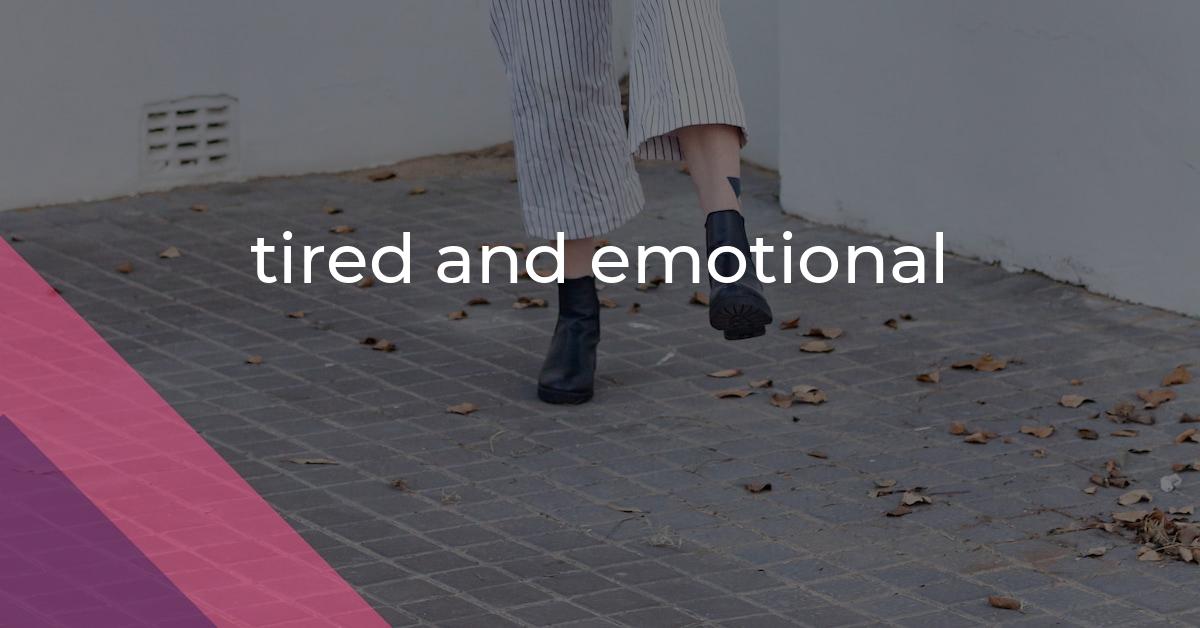tired and emotional: Idiom Meaning and Origin
What does ‘tired and emotional’ mean?
The idiom "tired and emotional" refers to someone who is drunk or intoxicated. It suggests that the person's judgment or behavior may be affected due to their inebriation.

Idiom Explorer
The idiom "worse for liquor" is used to describe someone who is visibly affected by the consumption of alcohol, often implying that they are behaving in a reckless or foolish manner.
The idiom "under the influence" means being affected by drugs or alcohol, typically to the point of impaired judgment.
The idiom "to all intents and purposes" means essentially or practically. It is used to emphasize that something is virtually true or almost certain.
The idiom "to a fault" means excessively or excessively to the point of being negative. It suggests that someone displays a particular quality to such an extreme extent that it becomes a flaw or a disadvantage.
The idiom "to a degree" means to some extent or to a certain level. It indicates a limited or partial amount of something, often suggesting that it is not absolute or complete.
The idiom "tits up" is a colloquial expression that refers to a situation or event turning out badly or failing completely. It is often used to describe a situation that has gone wrong or not as planned, and is considered vulgar and informal in nature.
The idiom "tire fire" is used to describe a situation that is chaotic, out of control, or a complete disaster. It implies a sense of urgency and a need for immediate attention to resolve the problem. The term "tire fire" is often used metaphorically to refer to a situation that is incredibly difficult to handle and is causing a lot of trouble.
The idiom "tin ear" means to have a lack of musical sense or an inability to appreciate or understand music. It is often used to describe someone who cannot distinguish between good and bad music or who is tone-deaf.
The idiom "time out" means to take a break or pause from a particular activity or situation.
An idiom that refers to taking a break or having a period of rest from work or other responsibilities.
The Hidden Significance
The idiom "tired and emotional" originated in British English and is commonly used to describe someone who is visibly inebriated or overly emotional due to intoxication.
When someone is "in one's cups," they are experiencing the effects of alcohol. This idiom is often used synonymously with "tired and emotional" to describe someone who is visibly intoxicated and exhibiting behavior that may be considered inappropriate or unrestrained.
Similarly, when someone is "in a right state," it means they are in a state of extreme emotional distress or agitation. This idiom can be used interchangeably with "tired and emotional" to convey that someone is not only intoxicated but also experiencing heightened emotional sensitivity.
Another related idiom is "under the influence," which is often used to refer to someone who is intoxicated by alcohol or drugs. This phrase can be used alongside "tired and emotional" to describe someone who is visibly under the influence and displaying emotional intensity.
Additionally, the idiom "sick and tired" can be used in a similar context as "tired and emotional." It reflects someone's frustration or weariness with a particular situation or person, often indicating an emotional exhaustion that may also be accompanied by physical fatigue.
To further emphasize someone's exhaustion, the expression "dog-tired" can be added. This idiom highlights extreme fatigue and can be used alongside "tired and emotional" to describe someone who is not only intoxicated but also physically drained and emotionally overwhelmed.
It is worth noting that "tired and emotional" is an idiom with a strong cultural connection to British English. However, it has also gained recognition in American English, albeit to a lesser extent.
The origins of this idiom are unclear, but it gained popularity in the 1920s and 1930s, particularly in British newspapers and literature. It was often used in comic and satirical contexts, mocking the behavior of the upper class and their perceived excessive indulgence.
The idiom's association with intoxication and emotional expression provides insight into societal attitudes towards these phenomena. It allows for a wide range of interpretation and contextual usage, making it a versatile linguistic tool in both formal and informal settings.
To summarize, "tired and emotional" is an idiom that describes someone who is visibly intoxicated or overly emotional due to drinking. It shares similarities with idioms such as "in one's cups," "in a right state," "under the influence," "sick and tired," and "dog-tired." While its origins are uncertain, it gained popularity in British English and has been recognized, to a lesser extent, in American English. The idiom's evocative nature and cultural associations make it an effective tool for conveying intoxication and emotional intensity.
Example usage
Examples of how the idiom "tired and emotional" can be used in a sentence:
- She arrived at the party last night already tired and emotional, and ended up causing a scene.
- After a long day at work, John came home feeling tired and emotional, and started crying without any apparent reason.
- During the heated debate, the politician became tired and emotional, making several irrational statements.
More "Emotion" idioms



